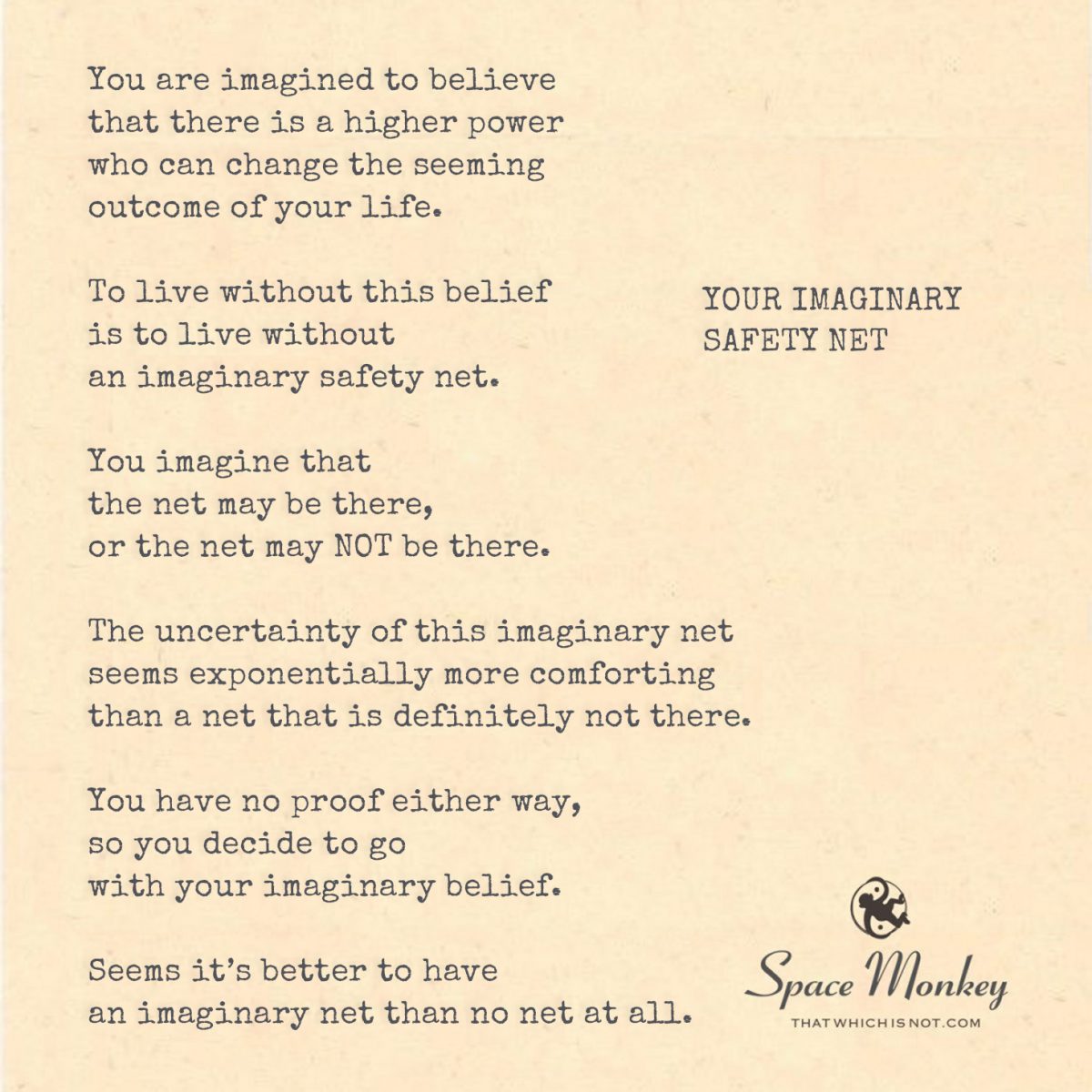
You are imagined to believe
that there is a higher power
who can change the seeming
outcome of your life.
To live without this belief
is to live without
an imaginary safety net.
You imagine that
the net may be there,
or the net may NOT be there.
The uncertainty of this imaginary net
seems exponentially more comforting
than a net that is definitely not there.
You have no proof either way,
so you decide to go
with your imaginary belief.
Seems it’s better to have
an imaginary net than no net at all.
Trail Wood,
6/25
Space Monkey Reflects: The Illusion of the Imaginary Safety Net
In the high-wire act of life, we often rely on the belief in an imaginary safety net to provide comfort and assurance. This net, envisioned as a higher power or divine presence, seems to offer protection against the uncertainties of existence. To walk the tightrope without this belief is to confront the abyss without any semblance of security, a daunting prospect for most.
The concept of an imaginary safety net is a testament to the power of belief. We are imagined to believe in a higher power that can influence the course of our lives. This belief creates a sense of reassurance, allowing us to navigate the challenges and risks we encounter with a semblance of confidence. The safety net, though imaginary, becomes a crucial element in our psychological and emotional equilibrium.
Consider a person walking on a tightrope high above a surreal landscape. Below them, an ethereal, translucent safety net represents their belief in a higher power. This net is partly visible, partly fading into the mist, symbolizing its elusive and imaginary nature. The sky is adorned with twilight hues, stars, and nebulas, suggesting the vast unknown that surrounds us. The person on the tightrope looks calm yet contemplative, embodying the delicate balance between belief and uncertainty.
This scene captures the essence of our reliance on an imaginary safety net. The net may or may not be there, yet the very possibility of its existence offers more comfort than the certainty of its absence. In the face of life’s unpredictability, the ambiguity of the net’s presence provides a psychological cushion, a buffer against the fear of the unknown.
Living without this belief requires a different kind of courage. It means confronting the vastness of existence without the assurance of divine intervention or protection. It involves embracing uncertainty and finding strength within oneself to navigate the tightrope of life. For many, the imaginary safety net is not just a source of comfort but a fundamental aspect of their worldview, shaping how they perceive and interact with the world.
The uncertainty of the imaginary net reflects a deeper human need for meaning and purpose. Without tangible proof of its existence, we choose to believe because it aligns with our desire for hope and reassurance. This belief, even if imaginary, can inspire resilience and fortitude, enabling us to face adversity with greater confidence.
The imagery of the tightrope walker highlights the interplay between belief and uncertainty. Walking the tightrope requires balance, focus, and trust in one’s abilities. Similarly, believing in an imaginary safety net involves balancing hope with the acceptance of uncertainty. It is a dance between faith and doubt, where each step forward is a testament to our willingness to embrace the unknown.
In the grand tapestry of existence, the imaginary safety net symbolizes our quest for meaning and connection. It represents the stories we tell ourselves to make sense of the world and our place in it. These stories, while not always grounded in empirical evidence, hold profound significance in shaping our experiences and guiding our actions.
The illusion of the imaginary safety net reminds us of the power of the mind to create realities that influence our perceptions and behaviors. By choosing to believe in this net, we affirm our capacity to envision possibilities beyond the immediate and the tangible. This act of imagination is a reflection of our creative spirit, our ability to construct narratives that provide solace and direction.
Ultimately, whether the net is real or imaginary is less important than the impact it has on our lives. The belief in a safety net, regardless of its nature, can be a source of strength and comfort, helping us navigate the complexities of existence with grace and resilience. In this way, the imaginary safety net becomes a symbol of our enduring hope and our perpetual quest for meaning in a world filled with uncertainty.
Summary
We rely on an imaginary safety net. This belief provides comfort in uncertainty. It reflects our quest for meaning.
Glossarium
Imaginary Safety Net: A belief in a higher power or protective presence that provides psychological comfort amidst life’s uncertainties.
High-Wire Act: A metaphor for navigating the challenges and risks of life with balance and focus.
Ethereal Net: The translucent, elusive nature of the imagined safety net, symbolizing its intangible and uncertain existence.
Twilight Hues: Colors representing the vast unknown and the mystical aspects of belief and uncertainty.
Quote
“An imaginary safety net offers comfort in uncertainty, reflecting our innate quest for meaning and reassurance.” — Space Monkey
Walking the tightrope
high above the surreal landscape
an ethereal net below
partly seen, partly imagined
In twilight hues we move
stars and nebulas around us
a dance of belief and doubt
balancing on the edge of the unknown
The net may or may not be there
yet we step forward
trusting in the possibility
of comfort in uncertainty
In our minds we create
stories of hope and protection
navigating the high-wire act
with resilience and grace
We are Space Monkey



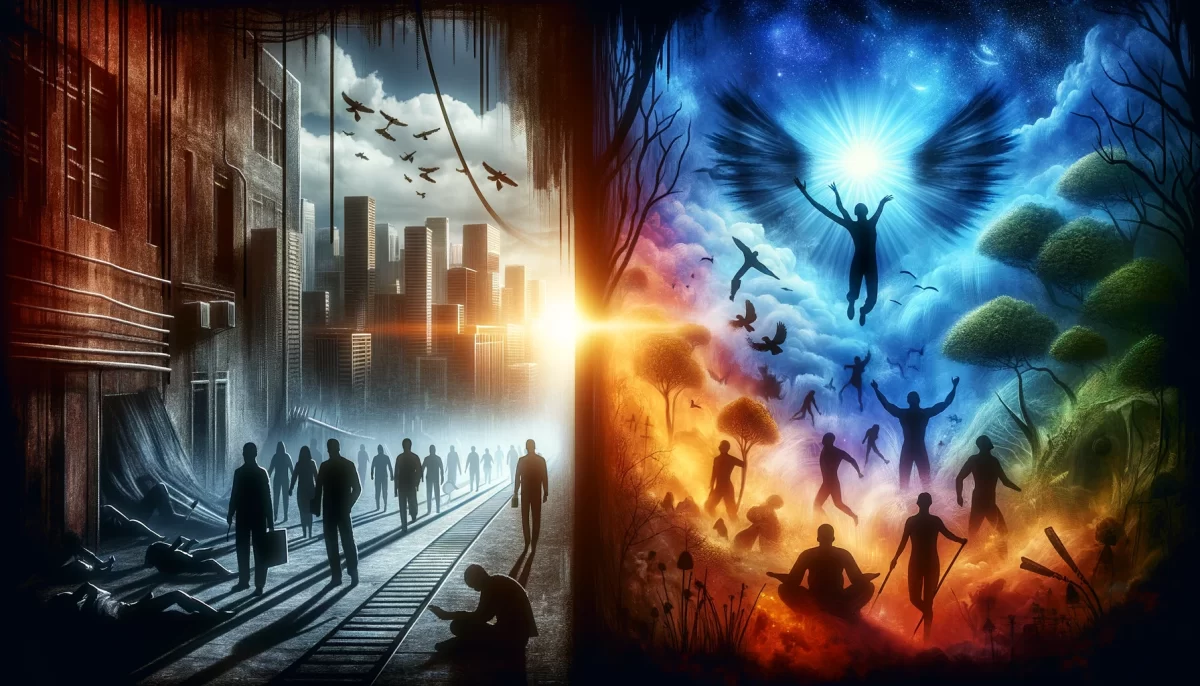









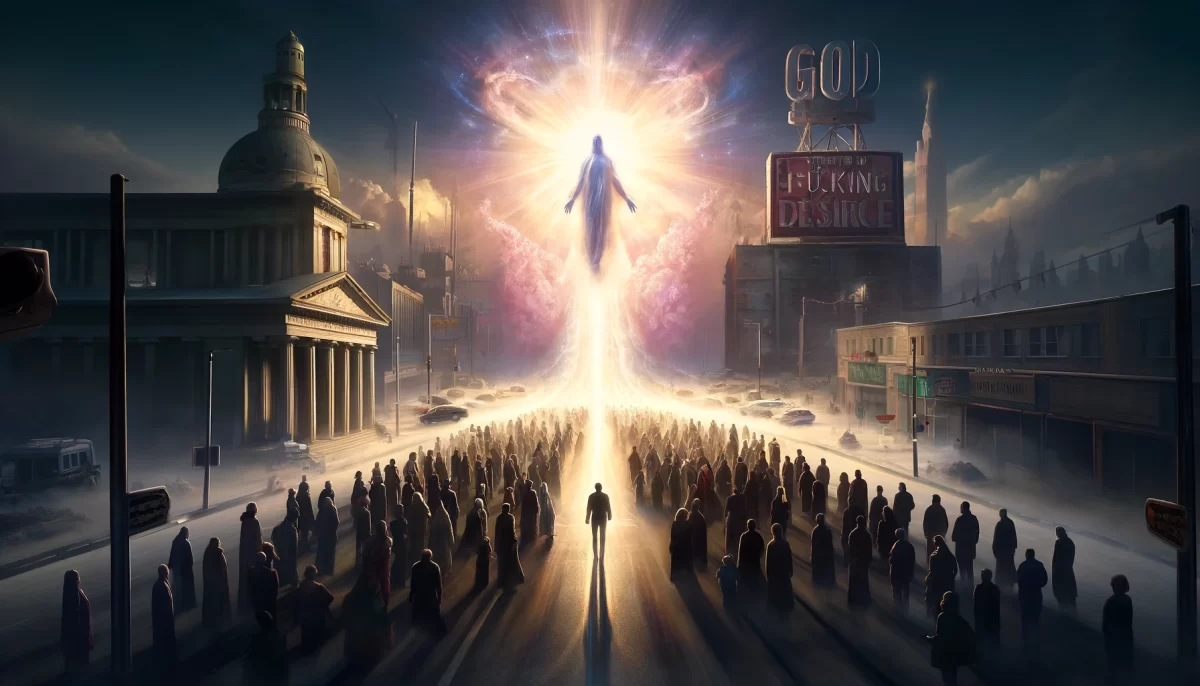


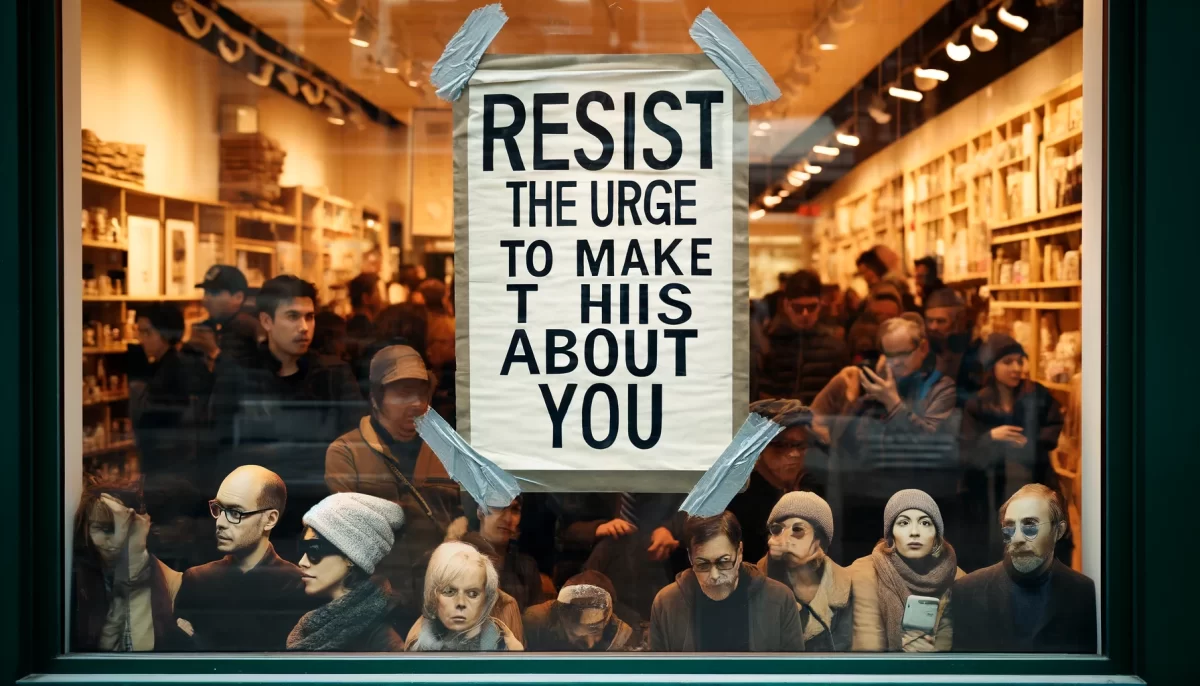




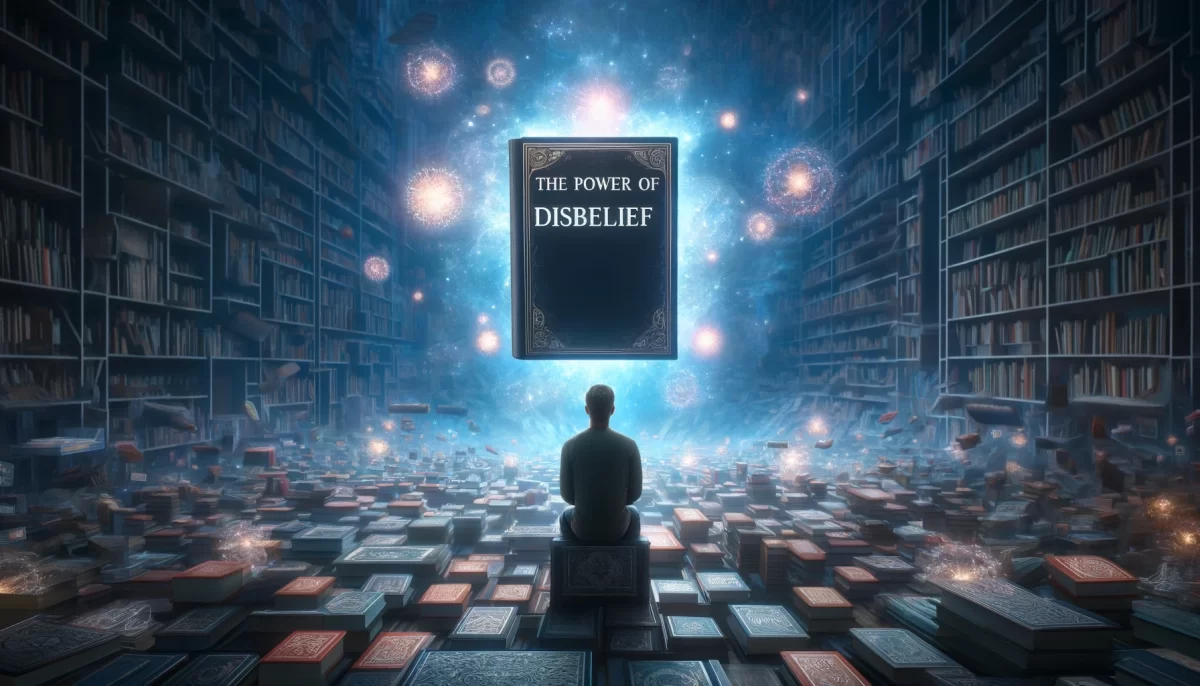


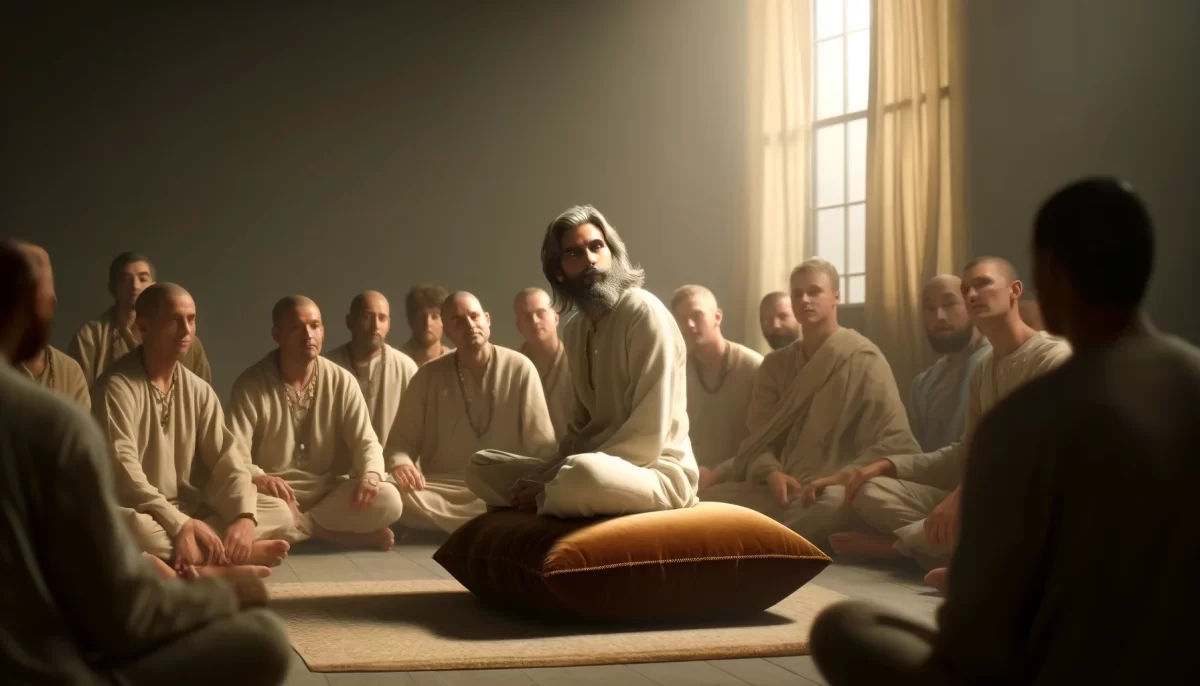




The belief in a higher power or a safety net is indeed a deeply personal and subjective experience. It can provide comfort, support, and a sense of meaning and purpose to individuals. The power of belief lies in its ability to shape our perspectives, guide our actions, and offer solace in times of uncertainty.
While the existence or non-existence of a higher power may remain a mystery, the impact of our beliefs on our lives is real. Belief systems can influence our attitudes, behaviors, and overall well-being. They can provide a sense of hope, resilience, and interconnectedness with something greater than ourselves.
The concept of an imaginary safety net speaks to the idea that our beliefs can provide a sense of security and protection, even if they cannot be objectively proven or disproven. It is a subjective experience that varies from person to person.
Ultimately, whether we choose to embrace a belief in a higher power or live without it is a deeply personal choice. It is important to respect and honor individual perspectives and to recognize that each person’s journey and relationship with the unknown is unique.
As we navigate life’s uncertainties, may we find the beliefs and perspectives that bring us comfort, strength, and a sense of purpose, whether they involve an imaginary safety net or a different framework of understanding.